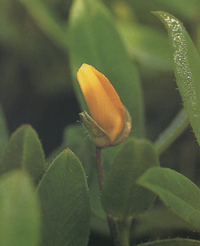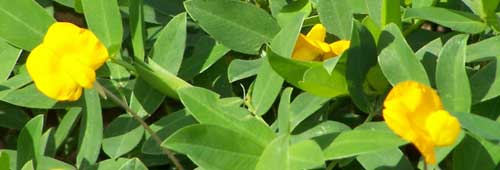|
|
What is Perennial Peanut?
 The Perennial Peanut is a high-quality persistent
tropical forage legume which can be grazed or
fed to horses, dairy and beef cattle, hogs, goats,
sheep and rabbits. It can be stored as dry hay or
silage, and is an ideal substitute for alfalfa.
Florigraze and Arbrook cultivars of perennial
peanut, or rhizoma peanut, as it is sometimes
called, have been selected in Florida for their high
yield, quality, persistence, disease resistance, and
drought tolerance.
The Perennial Peanut is a high-quality persistent
tropical forage legume which can be grazed or
fed to horses, dairy and beef cattle, hogs, goats,
sheep and rabbits. It can be stored as dry hay or
silage, and is an ideal substitute for alfalfa.
Florigraze and Arbrook cultivars of perennial
peanut, or rhizoma peanut, as it is sometimes
called, have been selected in Florida for their high
yield, quality, persistence, disease resistance, and
drought tolerance.
Perennial peanut is well-adapted to dry, sandy
soils, and has the potential to persist indefinitely.
Perennial peanut is planted using rhizomes, or
underground stems, dug from a nursery planting. It
does not require nitrogen fertilizer, and once
established, can be maintained with low level
management. Hay yields in north Florida range
from 3-5 tons per year for well-established stands.
Quality and uses are so similar to that of alfalfa that
perennial peanut has been coined "Florida's alfalfa."
Perennial peanut grows well in Florida, south
Georgia and southern portions of the Gulf States. It
requires no pesticides for control of insects or
diseases nor does it require applied nitrogen as do
traditional grass forages. These characteristics make
perennial peanut an environmentally sound, low
resource consuming crop that ranks it as an important
component for sustainable agricultural systems.
|



